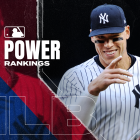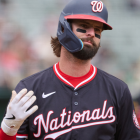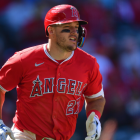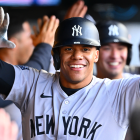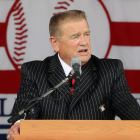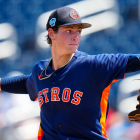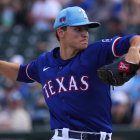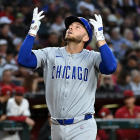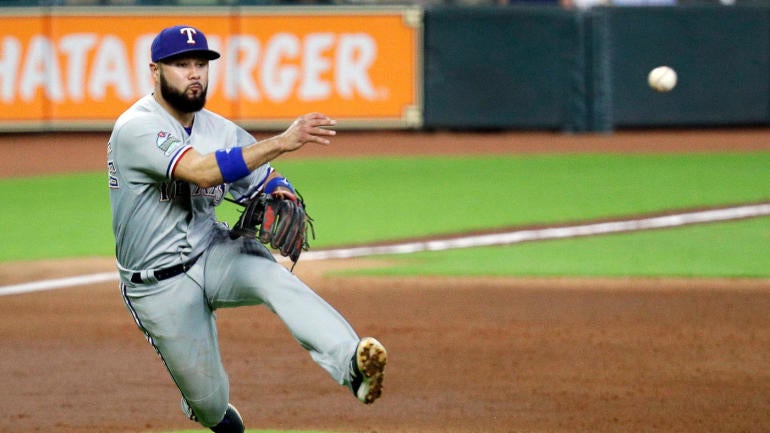
When the 2021 MLB season begins, the Texas Rangers may have a new-look infield. The Rangers are planning to give Gold Glove third baseman Isiah Kiner-Falefa a chance to be their starting shortstop next season, the team announced Tuesday. Nick Solak will return to second base, his natural position, after spending most of 2020 in the outfield.
Veterans Elvis Andrus and Rougned Odor, the team's longtime double-play combination, have been told to prepare for utility roles. The team informed the players involved now so they could tailor their offseason workouts accordingly.
"This wasn't an easy decision based on what Elvis has done for the organization," manager Chris Woodward told reporters, including MLB.com's T.R. Sullivan, on Tuesday. "It comes down to, 'Do we believe in Kiner as a shortstop?' I want to see it. Can he handle the position? I believe he can. We felt Kiner was ahead in our minds, so we felt, 'Let's name him the starting shortstop.' He still has to earn that. Nothing in this camp is going to be given."
Andrus has started Opening Day at shortstop for the Rangers every year since 2009 -- the last player to start Opening Day at short before Andrus was Michael Young -- and Odor has started at second base on Opening Day every year since 2015. Those two have struggled greatly the last few years, however, and the Rangers are now emphasizing youth. This is a changing of the guard, clearly.
Here's what the revamped infield means for the Rangers going forward.
Kiner-Falefa at shortstop
Kiner-Falefa, 26 in March, has had a unique career path. He was drafted as an infielder in 2013, the Rangers moved him to catcher in 2016, and he made his MLB debut as a backup catcher and utility infielder in 2018. Kiner-Falefa won the starting third base job in Summer Camp this past season, displacing veteran Todd Frazier. He then won the AL Gold Glove at the position.
"Something I have dreamt about my whole life and I have worked really hard," Kiner-Falefa told Sullivan about the move to short. "I went through catching ... I got to learn the game from a lot of different perspectives. I don't think anybody has that type of resume."
In parts of three big-league seasons Kiner-Falefa has played 117 games at third base, 73 at catcher, 20 at second base, and 17 at shortstop. That includes 46 games at third and 15 at short in 2020. In the minors, Kiner-Falefa played more shortstop (142 games) than any other position, though he also played over 100 games each at second and third.
His defensive numbers at third base the last three years are outstanding:
- Defensive Runs Saved: 18 (3rd in MLB behind Nolan Arenado and Matt Chapman)
- Outs Above Average: 13 (4th in MLB behind Arenado, Chapman, and Jedd Gyorko)
Kiner-Falefa's defensive numbers at short are good as well (4 DRS and 1 OAA), though the sample size is limited. He does have experience at the position though, and he clearly has the athleticism and instincts to handle the hot corner, so it makes sense for a rebuilding -- perhaps "transitioning" is a better word -- team to try him at short. Worst-case scenario is he can't handle it and has to move back to third base, putting the Rangers right back where they started.
It should be noted Kiner-Falefa is not much of a hitter. His .280/.329/.370 batting line in 2020 represents career highs across the board, though that still works out to only a comfortably below-average 91 OPS+. This is a player who's hit 15 home runs in just under 3,000 plate appearances in his career, majors and minors. The offensive bar at short is historically lower than it is at third, so moving Kiner-Falefa to short ostensibly helps the offense by allowing the team to find a new third baseman.
Solak at second base
I know this much: Texas loves Solak. Acquired from the Rays in the Peter Fairbanks trade last year, the Rangers see Solak and a future impact hitter and lineup cornerstone. His 89.9 mph average exit velocity and 90.4 percent in-zone contact rate put him on the cusp of the 90/90 club in 2020, which is rarified air usually only populated by megastars like Mookie Betts and Anthony Rendon.
The thing is, the soon-to-be 26-year-old Solak does not have an obvious position. He was drafted as a second baseman, he played some third base and outfield in the minors, and this past season the Rangers used him primarily in left (29 games) and center (13 games) fields. Solak also played 17 games at second and Texas will give him another go there again in 2021.
"He has to prove that he can handle the second base position defensively," Woodward told Sullivan. "Let's focus on second base to see how good of a second baseman you can possibly be. I think we'll see a better version of him."
Thanks to the shift and data-driven positioning (and all the strikeouts), it is easier to hide a poor defender at second base than at any other point in baseball history. The toughest part of the job is the blind double play pivot. Teams can compensate for the lack of range with positioning. Mastering the double play pivot will determine Solak's future at second more than anything, and if he can make it work, the Rangers could really have something because the offensive bar at second base is quite low these days.
Given their current state, it only makes sense for the Rangers to give Solak another legitimate chance at second base. It has been a few years since the last time he reported to spring training as a true second baseman. He's spent the last several springs learning new positions. Let him focus on second, given him a season to work on it, and see what happens. If it works, great! If not, then the Rangers can figure something out. I think they're smart not close the door on Solak at second just yet.
Whither Andrus and Odor?
Andrus and Odor have been very bad the last two years and they both still have a good chunk of change coming their way, so the Rangers aren't letting salary dictate these moves. They're moving the high-priced veterans to the bench and playing the kids on the middle infield. I mean, look at these two:
| Andrus (age 32) | Odor (age 26) | |
|---|---|---|
2019 performance | 78 OPS+ and 2.0 WAR in 147 games | 79 OPS+ and 0.0 WAR in 145 games |
2020 performance | 58 OPS+ and -0.6 WAR in 29 games | 64 OPS+ and -0.8 WAR in 38 games |
2021 salary | $14 million | $12 million |
2022 salary | $14 million | $12 million |
2023 salary | $15 million vesting option | $13.5 million club option ($3 million buyout) |
The Rangers owe Andrus and Odor a combined $55 million the next three years (assuming they avoid Andrus' vesting option) and it would be very easy to say "let's give them one more chance in 2021 and hope they can rebound with a normal season." I reckon more than a few teams will do that with their well-paid but underperforming veterans. Texas is not among them.
Andrus and Odor have spent their entire MLB careers at shortstop and second base, respectively. You have to go back to their days in the minors for the last time either played another position, and even then it was only scattered appearances. Moving into utility roles will be an entirely new experience. They have to learn new positions, where to go on cutoff plays, the whole nine.
What happens with Andrus and Odor going forward is entirely up to them. They can collect their money and sulk, or they could be good teammates and work hard, and play with a chip on their shoulder. I would bet on the latter. The Rangers want Solak and Kiner-Falefa to be their new double play combination. They will be thrilled if Andrus and Odor play well enough to force them to reconsider though.
"Elvis would certainly prefer to remain at shortstop," GM Jon Daniel told Sullivan. "He is in a good spot mentally and physically, really getting after it this winter. He expressed his confidence and belief he has a lot more good baseball to play. I was glad to hear that."
What about third base?
The best-case scenario is Kiner-Falefa and Solak work out on the middle infield and the Rangers only need to figure out what to do at third base moving forward. Worst case is they flop at their new positions and Texas has to move Kiner-Falefa back to third, where he's a great defender but a below-average hitter, and Solak is a man without a position. We like to be optimistic here at CBS Sports, so let's assume the new double play combination works out. What happens at third base then?
Coincidentally (or perhaps not), the Rangers top prospect is a third baseman: Josh Jung. Jung, the No. 8 pick in the 2019 draft, hit .316/.389/.443 in 44 minor-league games last year and is probably a year away from helping the Rangers. If not for the pandemic, he might've been in the third base mix for Opening Day 2021. Here's a snippet of R.J. Anderson's scouting report:
Despite being selected eighth overall, Jung (it's pronounced "young") was the fourth collegiate bat off the board in 2019. Based on that sentence, you might suspect that he's a polished hitter who is reasonably likely to remain at his position; true on both accounts. What you might not guess is that he could lack a carrying tool unless he's able to maximize his offensive output by tapping into his raw power. Should Jung fail in that pursuit, he'll have a handful of averageish tools, which isn't the worst-case scenario -- that would entail his power playing so light as to diminish his potential to hit for average and walk at a high clip.
"We've got some young players we don't expect to be ready for Opening Day, but we think will factor at that position going forward," Daniels told Sullivan, referring not only to Jung but fellow third base prospects Sherten Apostel and Davis Wendzel.
Assuming the Rangers want to keep third base open for Jung (or Apostel or Wendzel) long-term, they figure to seek a stopgap this winter only. Spending big money to sign DJ LeMahieu or trading significant prospects to acquire Kris Bryant doesn't seem to be in the cards. Signing another Todd Frazier type, or maybe just rolling with Andrus and Odor at the hot corner for the time being, is the most likely outcome, I think.
The most notable exception: Ha-Seong Kim. The star Korean shortstop will be posted for MLB teams soon and the Rangers are already said to have interest in him. Signing Kim could lead to the Rangers abandoning their plan with Kiner-Falefa, or it could lead to further infield shuffling. Kim is talented but not a stone cold lock to remain at short in the big leagues. He could wind up at third base, or maybe second with Solak playing elsewhere.
Next year's free-agent class is loaded with elite shortstops (Javier Baez, Carlos Correa, Francisco Lindor, Corey Seager, Trevor Story) so, if the Kiner-Falefa experience fails and the Rangers don't want to put Andrus back at short full-time, Texas could splurge and land a stud free agent next winter. They made a run at Anthony Rendon last offseason, remember, and they just opened a new ballpark. Even with the pandemic, they have money hiding under a mattress somewhere.
For now, the Rangers have made it clear they are ready to reduce their reliance on Andrus and Odor, and Kiner-Falefa and Solak will get the first crack at taking their jobs. If they don't work out, the Rangers will pivot elsewhere, but it only makes sense for a team that has lost more games the last four seasons than the Pirates (!) to make changes and emphasize youth.




















